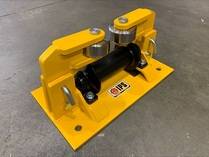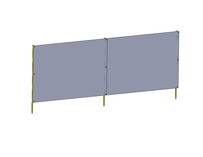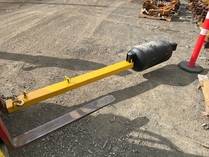Call our trained professionals today!
News Calendar | |||
Custom Railway Equipment Supplier | How Precision Engineering Drives Performance
Oct 02, 2024Globally, rail systems transport millions of people and billions of tons of cargo every year. They're an intricate web of engineering marvels, from the tracks that guide trains to the locomotives that power them. One of the most essential yet often overlooked components of this complex system is custom railway equipment - designed specifically to ensure smooth, safe, and efficient operations. At IPS, we specialize in creating solutions tailored specifically to the needs of the railway industry. As a custom railway equipment supplier, we understand that every project varies dramatically and focus on providing precision-engineered components. Our unwavering commitment to quality and innovative design principles ensures that the equipment you receive will not only integrate smoothly into your existing infrastructure but also significantly enhance safety, efficiency, and reliability in your operational processes.

Custom railway equipment refers to tools, components, and machinery specifically tailored to meet the unique requirements of specific railway operations. While standard equipment may suffice for general applications when it comes to performing more specialized tasks - like maintaining high-speed rail lines, handling heavy freight loads or operating under extreme weather conditions - specialized custom solutions become indispensable. Their precision engineering ensures they fit seamlessly within existing infrastructure while performing optimally under demanding circumstances. Precision engineering ensures that every component fits seamlessly together, decreasing mechanical failures and prolonging equipment lifespan. Furthermore, precision engineering allows for the development of tools and parts specifically tailored to specific challenges like extreme weather or heavy loads without compromising performance. Ultimately, this attention to detail not only increases operational efficiency but also helps ensure overall railway system safety and reliability.
One of the first steps in the precision engineering of custom railway equipment is selecting materials. Material choice plays an integral part in determining its durability, strength, and overall performance; for instance, components that will experience high levels of strain, such as rail clamps or brake shoes, should be constructed from materials capable of withstanding extreme forces without deforming or failing under pressure. Materials typically employed in custom railway equipment include high-strength steel, which provides outstanding durability and resistance to wear and tear; aluminum, which is lightweight yet corrosion resistant; and specialty alloys that combine multiple metals' best properties. When selecting material, environmental considerations such as moisture exposure, temperature fluctuations and chemical corrosion must also be taken into account to ensure maximum longevity and reliability for equipment longevity and performance.
Once materials have been selected, precision manufacturing begins. This stage involves accurately cutting, shaping, and assembling components using advanced techniques like CNC (Computer Numeric Control), laser cutting, and precision welding to meet exact specifications for custom railway equipment. CNC allows intricate designs with micron-level precision tolerances, while laser cutting ensures clean edges to prevent stress points or potential failure in equipment.
Precision welding is an integral component of creating custom railway equipment. In high-performance components, welding must be done carefully to ensure strong joints that don't have defects that could compromise their integrity. Robotic welding and laser welding provide precision and consistency. The heart of precision engineering lies in design. Designing custom railway equipment using advanced modelling and simulation tools allows engineers to meet specific application requirements while simultaneously analyzing stresses and strains for optimization to make sure it's performing well and lasting.
Finite element analysis (FEA) is an invaluable simulation tool used to predict how components will respond under various loads and conditions. By simulating the real-world forces that the equipment will encounter, engineers can identify potential weak spots in its design and make necessary modifications before manufacturing commences. This proactive approach not only enhances equipment performance but also lowers the likelihood of costly failures in the field. Engineers take into account factors like weight distribution, thermal expansion and vibration when designing custom railway equipment. All these factors can have a substantial effect on the performance and safety of this machinery; precision engineering ensures they are considered in its design process.
Before any custom railway equipment is deployed in the field, it must go through rigorous testing and validation processes to ensure it satisfies performance standards. This phase ensures that it will work as intended under real-world conditions. Testing typically involves subjecting equipment to various operational conditions that simulate use, such as extreme temperatures, heavy loads and extended use. Brake components should be tested through repeated braking cycles to verify their performance and prevent premature wear and tear, while rail clamps may be put through various load conditions to evaluate whether they hold securely in place. Validation entails safety testing to verify that equipment conforms with industry standards and regulations, such as resistance to impact testing or environmental factors testing, which enables design adjustments prior to certification for use.
Custom railway equipment that has been precisely engineered offers superior performance compared to standard solutions. For instance, precision-engineered rail clamps offer better gripping power on rails for reduced movement risk and smoother ride comfort for trains. Custom brake components also deliver more consistent braking performance for shorter stopping distances and greater safety. Precision engineering allows for the optimization of equipment for specific tasks. For instance, custom rail carts can be designed with weight distributions and suspension systems tailored specifically to their duty load so as to handle heavy loads more effectively while reducing wear and tear on both equipment and tracks. Achieving such levels of optimization requires advanced engineering techniques and materials - only made possible through precision engineering.
Precision engineering not only improves performance and safety but also contributes to reduced maintenance costs. Custom railway equipment manufactured to exact specifications has lower wear-and-tear rates and maintenance needs; for instance, custom-designed rail clamps that fit securely on rails are less prone to fatigue or deformation, prolonging their service life while decreasing costly maintenance needs. Likewise, precision-engineered wheels and axles experience less friction wear, which results in extended intervals between maintenance visits and decreased overall costs.
As the railway industry evolves, demand for custom railway equipment will only continue to increase. Recent advances in materials science, manufacturing technology, and engineering design are creating even more precise and cost-efficient custom solutions. For instance, additive manufacturing (3D printing) shows great promise as an option for producing complex components that are impossible to produce using traditional methods of production.
Custom railway equipment embodies the power of precision engineering. By meticulously designing, manufacturing, and testing each component to exacting standards, custom railway equipment suppliers ensure their products offer superior performance, enhanced safety, and lower maintenance costs for their products. As the railway industry grows and adapts over time, custom equipment--backed by its precision engineering--will play an increasingly pivotal role in shaping its future.
At IPS, we specialize in offering custom railway equipment solutions designed specifically to meet the demands of the railway industry. As custom suppliers, we understand that no two projects are alike, which is why our precision-engineered components are customized specifically to your project requirements and designed with quality and innovation in mind to enhance the safety, efficiency and reliability of operations. Our dedication to excellence guarantees you receive equipment which fits seamlessly with existing infrastructure while simultaneously improving it for improved operations.








